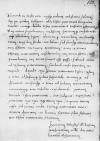Letter #745
Henricus BAERS to Ioannes DANTISCUSLeuven (Lovanium), [1532]-02-07
Manuscript sources:
Prints:
| ||||||||||
Text & apparatus & commentaryPlain textText & commentaryText & apparatus
Reverendo in Christo
Reverendo in Christo Patri
Licet ego, quidem indignus, olim Vestrae Paternitatis benignitate receptus cun<c>taque clenodia Vestrae Paternitatis praesentia perspexerim, non minus singularitatem, modestiam scientiamque considerando atque accuitatem ingenii memoriaeque tenacitatem multarumque rerum, non solum studio aut labore, sed simulque natura innatum, non obstante mei ingenii tenuitatem, quam in primis Vestram Paternitatem considerandam, non minus aestimo (ut proverbiorum, non omnes Senecas esse posse), fiduciali animo ad Vestram Paternitatem scribendi causa ingenium me impulit.
Evigilet ergo spiritus Paternitatis Vestrae ipsum a terra ad sursumque sidera suspirando mentemque ad distantias mensurasque, a terra ad siderum concavitatem connexuramque novo anhelitu considerando, quorum exempla Vestrae Paternitati (licet indignus) repraesento. Gratanter ergo rogo atque iterum rogo (non mei meriti causa, sed intimi cordis Vestraeque Paternitatis amore), accipere dignemini.
Ex
Per Vestrae Paternitatis servitorem,


 AAWO, AB, D. 6, f. 128v
AAWO, AB, D. 6, f. 128v